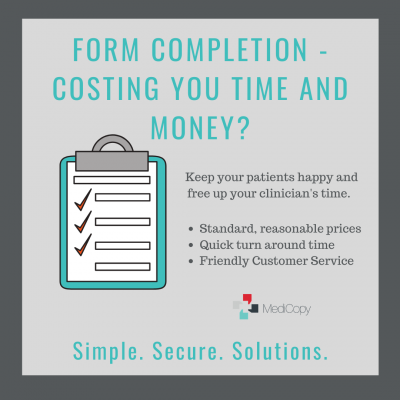It can be difficult for a practice to devote the time and resources necessary to complete FMLA, long term, and short term disability forms. Many practices have clinicians completing these administrative tasks when they could be meeting with patients. Adding form completion to a clinician’s daily to-do list without charging patients can be affecting your practice’s bottom line.
What Should My Practice Charge?
Deciding on an appropriate amount to charge for form completion can be challenging. There are a few things you need to consider before changing your current policies:
- Will patients be upset with a new charge?
- Will the charge be time and cost-effective for your practice
- Will the form be delivered to patients or insurers in a reasonable amount of time?
If your practice decides to charge for form completion, you will need to be prepared for a bit of pushback. Having a solid plan and expectation for when payment needs to be made, when forms will be completed, and how the forms will be released is key to dealing with disgruntled patients. Making the decision is the first step, deciding what your clinician’s time is worth is the second.
Unfortunately, form completion charges are virtually incomparable from practice to practice.
A five doctor orthopedic practice, for example, had nurses completing disability forms for a charge of $20 perf orm, whereas a ten doctor cardiology practice had an administrator completing the same form for a charge of $50 per form, and an eight practitioner urgent care clinic had the care provider completing the form for a charge of $100, per form.
When deciding what to charge, you will need to figure out how often forms are being completed, decide who you would like to complete the forms, and factor in how long the form completion will take. Other things to consider: turn-around time for form completion, the salary of the individual completing the form, and how forms will be sent out.
Best Practices for Success
Every practice should have a policy and process to successfully complete forms. A patient’s livelihood often depends on submitting a form quickly and accurately. In order to provide a positive experience for the patient, it may be helpful to
- Have a documented policy for form completion, including charges, if applicable.
- Set expectations on policies and time frames with patients so they will not miss important deadlines.
- Post the policy in your office and on your website.
- Set attainable expectations and have a process that will work best for your individual practice.
Consider Outsourcing the Process
One of the things that makes form completion troublesome is the unpredictable volume of forms your practice may receive. One week you may see ten requests for forms and the following week there may be forty, so dedicating a full-time employee to the process can get tricky. Outsourcing may allow for more time on intentional patient encounters and a decrease in turnaround time leading to satisfied patients.
MediCopy has a dedicated team of form completion specialists ready and willing to help your practice increase overall patient satisfaction. A quick and easy three-step process will lift the weight from your clinician’s shoulders. MediCopy will 1) Receive a form 2) Invoice the patient or insurance company and then once payment is received 3) Complete the form and release it to the requestor.
Simple. Secure. Solutions.
